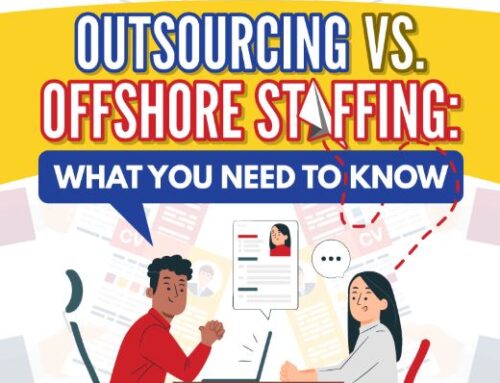The accounting industry is at a crossroads.
In 2021, the number of accountants, CPAs, and corporate finance workers in the United States dropped by 17%. Worse, fewer individuals took the CPA exams in 2022, marking the lowest participation since 2006. This year, there are 340,000 fewer accountants in the US than in 2019.
The Great Accountant Shortage stems from various factors, including:
- High cost of education.
- Declining workforce.
- Retirement of many experienced accountants.
- Departure of many seasoned accountants for more lucrative roles in finance and tech.
As America’s accounting firms struggle with this shortage, many have discovered that hiring offshore accountants can fill in the gap created by the scarcity of domestic accounting professionals. How does this help accounting firms scale their business? Read more to find out.
How Can Offshore Outsourcing Help Accounting Firms Scale?
The accountant shortage has placed accounting firms in a challenging position. With fewer professionals entering the field and experienced accountants leaving, firms face mounting pressure as the workload increasingly falls on a shrinking pool of staff.
Fortunately, offshoring provides a strategic way to bridge the chasm caused by the shortage of domestic accounting professionals. Despite the geographical distance from in-house teams, offshore accounting services help firms maintain their competitive edge in an ever-demanding business environment. By leveraging a talent pool from countries like the Philippines, US accounting firms can handle larger workloads and offer extended services to clients.
Frequently Asked Questions About Offshore Outsourcing
1. Why Should an Accounting Firm Consider Offshoring?
Offshoring provides a solution for accounting firms that are facing difficulties hiring new staff. By offshoring, firms gain access to a source of qualified professionals adept in international accounting standards, financial reporting, and tax regulations. This pool of talent not only ensures high-quality work but also supports the scalability of firms during peak seasons.
Offshore accountants are directly employed by the company — they follow its policies, procedures, and performance standards. Firms maintain high-quality performance by having full control over hiring and management of offshore teams, just as they do with in-house staff.
For example, management has full authority over who gets hired, ensuring that the selected candidates align with the organization’s standards and requirements. Offshoring not only addresses staffing gaps but also enables operational efficiency, strategic growth, and value delivery.
2. Is Offshore Outsourcing Suitable for Small Accounting Firms?
The short answer is yes! Offshore accounting is highly beneficial for small accounting firms looking to scale. Particularly because they provide small enterprises the following benefits:
- Lower labor costs compared to onshore staffing.
- Optimized resources for strategic initiatives.
- Easily adjustable workforce size based on demand.
- Improved turnaround times and client satisfaction.
- Access to a larger network of experienced professionals.
- Expanded service offerings to remain competitive.
- Freedom to focus on client acquisition.
- Increased profitability from reduced overhead.
3. Can Offshoring Help My Firm Take on More Clients?
Absolutely! Offshoring is an effective way to increase your firm’s capacity without overburdening your in-house team. New capabilities you’ll have available include:
- Handling more work without hiring additional staff.
- Quickly adjusting team size based on workload.
- Freeing onshore teams to prioritize client interactions.
- Easily adding new services without overwhelming current staff.
- Faster processing turnaround times enabling acquisition of more clients.
4. What Tasks Can an Accounting Firm Offshore?
Offshore teams can efficiently manage many accounting tasks. They can seamlessly integrate into your firm’s operations and provide reliable support across different areas of specialization. Here are just some of the activities you can delegate to offshore staff:
- Bookkeeping
- Payroll Processing
- Tax Preparation
- Data Entry
- Financial Reporting
5. How is Quality of Work Ensured When Offshoring?
Offshore success stories such as those of Accenture and JP Morgan Chase Co. are proof that companies can benefit immensely from offshoring. Their success though, didn’t happen without strong quality assurance.
For firms looking to hire offshore accountants, here’s how to maintain high standards of quality regardless of geographic distance:
- Use Service Level Agreements (SLAs) to set performance metrics.
- Provide comprehensive onboarding to align offshore teams with your firm’s standards.
- Foster a culture of collaboration and feedback.
6. What Tools or Technology Are Needed for Offshore Accounting to Work?
Technology plays a vital role in ensuring seamless collaboration between onshore and offshore teams. Essential tools to effectively manage accounting teams and workloads include:
- Cloud-Based Accounting Software
- Communication Tools
- File-sharing Systems
- Project Management Applications
- Cybersecurity Solutions
7. Can Offshoring Comply with Local Accounting Regulations?
Offshore providers experienced and knowledgeable about local accounting regulations can handle compliance effectively. Here’s why:
- Offshore providers specialize in accounting standards (e.g., GAAP, IFRS, and local tax laws).
- Offshore teams are kept updated on regulatory changes to ensure compliance.
8. Does Offshoring Limit My Firm‘s Control Over Operations?
For companies that haven’t leveraged offshore outsourcing, it might seem daunting. After all, going from managing staff in a local office to one located overseas isn’t how work has traditionally been done. However, when managed properly, it turns out there really isn’t that much difference in operational control.
Here are some strategies to manage offshore staff:
- Document workflows and expectations thoroughly.
- Implement structured reporting mechanisms.
- Use Key performance indicators (KPIs) to monitor progress.
- Adjust strategies based on performance data.
9. What to Look for in an Offshoring Provider?
Businesses must be able to trust a provider before offshoring their accounting functions overseas. Here are key considerations every business should ponder when evaluating an offshore provider:
- Strong background in accounting services.
- Adherence to regulatory compliance.
- Utilization of secure systems.
- Positive testimonials.
Why is Offshoring to the Philippines Key to Scaling Accounting Firms?
Offshoring to the Philippines offers accounting firms a strategic pathway to overcome workforce shortages and operational challenges.
Here are some of the reasons why the Philippines has become a go-to destination for firms seeking to scale efficiently.
1. Access to the Global Talent Pool
Offshore outsourcing connects accounting firms to a skilled pool of professionals trained in various accounting functions. The Philippines is a top destination for these needs due to their:
- Expertise in international accounting standards.
- Strong English proficiency.
- Cultural compatibility with western business practices.
- Supportive business environment.
- Legendary work ethic.
2. Cost Efficiency
Scaling requires resources, and one of the biggest hurdles for accounting firms is managing costs. Offshoring provides a cost-effective solution by reducing expenses related to:
- Compensation.
- Office space.
- Technology infrastructure.
3. Scalable Operations
Offshore outsourcing offers flexibility to scale operations up or down based on demand. With offshore teams, firms can expect:
- Ability to hire new staff without a long-term commitment.
- Lower costs of hiring and training.
- Fulfilled deliverables, even during peak seasons.
4. Enhanced Focus on Core Operations
With offshore teams handling routine and time-consuming tasks, in-house staff can focus on high-value activities that are critical for business growth, such as:
- Client Relationship Management.
- Strategic Financial Planning.
- Advisory Services.
Scale Your Accounting Firm with Offshore Outsourcing from EVES
Offshore outsourcing is a transformative strategy for accounting firms of all sizes. By leveraging global talent and establishing strong partnerships with reliable providers, firms can overcome industry challenges while delivering superior client services.
Elite Virtual Employment Solutions (EVES) is an offshore provider with a strong track record, positive reviews, and a deep understanding of the accounting industry.
Contact us at info@evesolutions.net to help your in-house team with its accounting needs.








Leave A Comment
You must be logged in to post a comment.